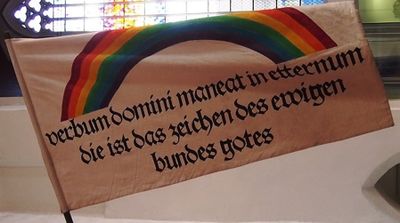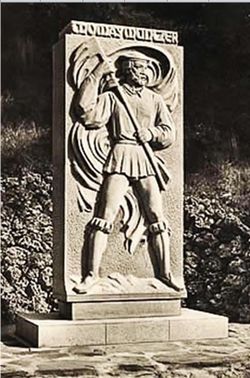Difference between revisions of "Rainbow Flag"
| [checked revision] | [checked revision] |
AlfRedekopp (talk | contribs) |
AlfRedekopp (talk | contribs) |
||
| Line 2: | Line 2: | ||
__TOC__ | __TOC__ | ||
[[File:Rainbow Flag.jpg|400px|thumb|right|''Thomas Müntzer's replica Rainbow flag in the Mühlhausen city Museum. The first line of text is in Latin and translates as: "The word of the Lord remains eternal", the next two lines in German translate as: "This is the sign of the eternal covenant of God." </br>Source: Wikipedia contributors. [https://en.wikipedia.org/wiki/Thomas_M%C3%BCntzer "Thomas Müntzer."] Wikipedia, The Free Encyclopedia. Wikipedia, The Free Encyclopedia, 27 May. 2018. Web. 31 May. 2018.'']] | [[File:Rainbow Flag.jpg|400px|thumb|right|''Thomas Müntzer's replica Rainbow flag in the Mühlhausen city Museum. The first line of text is in Latin and translates as: "The word of the Lord remains eternal", the next two lines in German translate as: "This is the sign of the eternal covenant of God." </br>Source: Wikipedia contributors. [https://en.wikipedia.org/wiki/Thomas_M%C3%BCntzer "Thomas Müntzer."] Wikipedia, The Free Encyclopedia. Wikipedia, The Free Encyclopedia, 27 May. 2018. Web. 31 May. 2018.'']] | ||
| − | [[File:ThomasMunzerMonument.jpg|250px|thumb|left|''Thomas Müntzer is often portrayed with a rainbow flag in his hand as seen in this statue of him in his home town of Stolberg (Harz), Germany.</br>Source: | + | [[File:ThomasMunzerMonument.jpg|250px|thumb|left|''Thomas Müntzer is often portrayed with a rainbow flag in his hand as seen in this statue of him in his home town of Stolberg (Harz), Germany.</br>Source: Wiedling, Stolberg (Harz), postcard photo].'']] |
The Rainbow Flag was a [[Radical Reformation]] banner and was in particular the banner of [[Müntzer, Thomas (1488/9-1525)|Thomas Müntzer]] (1489-1525). The flag displayed the universally known rainbow, a meteorological phenomenon of a multicolored arc spectrum of light seen in the sky caused by sunlight refracted by air born water droplets. German peasants raised this flag in 1525 as one of their symbols in their revolution, demanding reform of the Christian Church and political freedoms in what became known as the [[Peasants' War, 1524-1525|Great German Peasants' War]] (Große Deutscher Bauernkrieg). | The Rainbow Flag was a [[Radical Reformation]] banner and was in particular the banner of [[Müntzer, Thomas (1488/9-1525)|Thomas Müntzer]] (1489-1525). The flag displayed the universally known rainbow, a meteorological phenomenon of a multicolored arc spectrum of light seen in the sky caused by sunlight refracted by air born water droplets. German peasants raised this flag in 1525 as one of their symbols in their revolution, demanding reform of the Christian Church and political freedoms in what became known as the [[Peasants' War, 1524-1525|Great German Peasants' War]] (Große Deutscher Bauernkrieg). | ||
Revision as of 13:08, 31 May 2018

Source: Wikipedia contributors. "Thomas Müntzer." Wikipedia, The Free Encyclopedia. Wikipedia, The Free Encyclopedia, 27 May. 2018. Web. 31 May. 2018.
The Rainbow Flag was a Radical Reformation banner and was in particular the banner of Thomas Müntzer (1489-1525). The flag displayed the universally known rainbow, a meteorological phenomenon of a multicolored arc spectrum of light seen in the sky caused by sunlight refracted by air born water droplets. German peasants raised this flag in 1525 as one of their symbols in their revolution, demanding reform of the Christian Church and political freedoms in what became known as the Great German Peasants' War (Große Deutscher Bauernkrieg).
In the few years after 1517 when Martin Luther posted his Ninety-five Theses, numerous reform preachers began a flood of demands for religious, economic, and social improvements to the lives of ordinary German peasants. These peasants in the Holy Roman Empire sought the elimination of both tithes to absent clerics and taxes and restrictions place on them by the nobles. The failure to obtain these by 1524 led to the peasants fermenting armed revolution, resulting in the Great German Peasants' War.
A number of Radical Reformer preachers including Thomas Müntzer and Hans Hut (1490-1527) supported the demands of the peasantry. Many of these demands called for a new order for society and church. As activists Müntzer and Hut traveled to the Thuringia region in central Germany, preaching church reformation and social justice. The peasants demanding change rallied, armed themselves with improvised weapons, and a group gathered at the city of Mühlhausen. These had the rainbow on their flag. They chose the symbol of the rainbow as a sign of new hope and as a symbol of God's everlasting covenant with humanity (Genesis 9:12-13). The flag also had in German the text: "This is the sign of the eternal covenant of God."
Müntzer with his rainbow flag and a contingent of several hundred traveled about 65 kilometres to the east to the city of Frankenhausen (now named Bad Frankenhausen), joining and leading the peasant army numbering several thousand that was assembling there. On the 14-15 May 1525 the professional army of Landgrave Philip I of Hesse and Georg Duke of Saxony clashed with the peasant army at the Battle of Frankenhausen. During the first day of battle an actual rainbow appeared in the sky. Thomas Müntzer took this as a propitious sign of God's covenant support for deliverance from oppression and preached this to the peasant troops. However, it did not prevent the utter annihilation of the peasant army at the battle. Thomas Müntzer was captured, tortured, and executed. Hans Hut was also captured and interrogated but was eventually released. Though defeated the rainbow continued for many peasants as a symbol of hope, communal equity, brotherly love, and a reminder of God's never-ending covenant. The battle and rainbow are depicted in Werner Tübke's monumental panorama painting Frühbürgerliche Revolution in Deutschland (Early Bourgeois Revolution in Germany).
No copies of this original Rainbow Flag survive but a repica is displayed the in Mühlhausen city Museum.
Bibliography
Friesen, Abraham. Thomas Muentzer, a Destroyer of the Godless. Berkely, University of California Press. 1990: 259-263.
| Author(s) | Victor G Wiebe |
|---|---|
| Date Published | May 2018 |
Cite This Article
MLA style
Wiebe, Victor G. "Rainbow Flag." Global Anabaptist Mennonite Encyclopedia Online. May 2018. Web. 16 Apr 2024. https://gameo.org/index.php?title=Rainbow_Flag&oldid=160794.
APA style
Wiebe, Victor G. (May 2018). Rainbow Flag. Global Anabaptist Mennonite Encyclopedia Online. Retrieved 16 April 2024, from https://gameo.org/index.php?title=Rainbow_Flag&oldid=160794.
©1996-2024 by the Global Anabaptist Mennonite Encyclopedia Online. All rights reserved.
